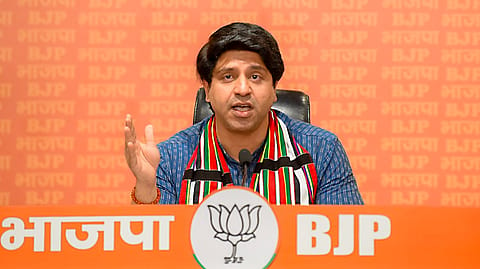GST 2.0 reforms to kick off virtuous cycle in the economy: BJP
According to Poonawalla, the BJP National Spokesperson, the GST reforms will lead to lower costs, resulting in citizens having more disposable income, which in turn will drive higher consumption, production, job creation, and ultimately, a virtuous economic cycle.

GST 2.0 has witnessed remarkable growth in consumption from the very first day of coming into effect, said BJP National Spokesperson Shehzad Poonawalla on Tuesday, while addressing PHD Chamber of Commerce and Industry’s (PHDCCI) “GST Conclave – GST 2.0” at PHD House in New Delhi.
He cited Maruti Suzuki’s example to drive home his point. India’s largest carmaker broke its 15–20-year sales record, selling 30,000 units in a single day with additional requests for 80,000 units. Hyundai sold 11,000 vehicles, while leading electronic companies such as Haier reported a 15–20% growth compared to the previous week. Online platforms like Amazon and Flipkart also recorded substantial increases in traffic and sales.
“From Good and Simple Tax, GST 2.0 can now be translated into Gross Saving and Tax Low,” Poonawalla said. “It is a truly citizen-centric approach—benefitting consumers, farmers, manufacturers, and retailers alike. With lower costs, citizens will have more disposable income, which in turn will drive higher consumption, production, job creation, and ultimately, a virtuous economic cycle.”
Dr Ranjeet Mehta, CEO and Secretary General, PHDCCI, while emphasising India’s growth story, said, “If the journey from independence was remarkable, the last 11 years have been truly transformative for India. GST has been one of the most significant structural reforms of the Modi Government. GST 2.0 is not just a tax reform; it is the foundation of India’s growth story, central to the vision of Viksit Bharat. It sends a strong message that the government cares for its people and is committed to meaningful reforms.”
Commending the government on the landmark GST tariff restructuring, Pawan Arora, Chair of the IDT Committee, PHDCCI, recalled the historic introduction of GST in 2017, which subsumed 17 different taxes into one unified tax regime. He added that GST 2.0 further strengthens the ease of doing business while benefiting the common man, industry, and the overall economy.
The inaugural session of the Conclave concluded with Sandeep Garg, co-chair of the IDT Committee, PHDCCI, who emphasised that GST is not a destination but a continuous journey of reforms, collaboration, transformation, and nation-building. Over the past eight years, the Government of India has proactively addressed industry concerns and introduced amendments, making GST more mature and robust.